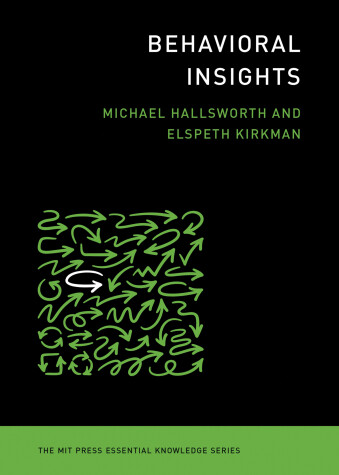The MIT Press Essential Knowledge
1 total work
The definitive introduction to the behavioral insights approach, which applies evidence about human behavior to practical problems.
Our behavior is strongly influenced by factors that lie outside our conscious awareness, although we tend to underestimate the power of this “automatic” side of our behavior. As a result, governments make ineffective policies, businesses create bad products, and individuals make unrealistic plans. In contrast, the behavioral insights approach applies evidence about actual human behavior—rather than assumptions about it—to practical problems. This volume in the MIT Press Essential Knowledge series, written by two leading experts in the field, offers an accessible introduction to behavioral insights, describing core features, origins, and practical examples.
These insights have opened up new ways of addressing some of the biggest challenges faced by societies, changing the way that governments, businesses, and nonprofits work in the process. This book shows how the approach is grounded in a concern with practical problems, the use of evidence about human behavior to address those problems, and experimentation to evaluate the impact of the solutions. It gives an overview of the approach's origins in psychology and behavioral economics, its early adoption by the UK's pioneering “nudge unit,” and its recent expansion into new areas. The book also provides examples from across different policy areas and guidance on how to run a behavioral insights project. Finally, the book outlines the limitations and ethical implications of the approach, and what the future holds for this fast-moving area.
Our behavior is strongly influenced by factors that lie outside our conscious awareness, although we tend to underestimate the power of this “automatic” side of our behavior. As a result, governments make ineffective policies, businesses create bad products, and individuals make unrealistic plans. In contrast, the behavioral insights approach applies evidence about actual human behavior—rather than assumptions about it—to practical problems. This volume in the MIT Press Essential Knowledge series, written by two leading experts in the field, offers an accessible introduction to behavioral insights, describing core features, origins, and practical examples.
These insights have opened up new ways of addressing some of the biggest challenges faced by societies, changing the way that governments, businesses, and nonprofits work in the process. This book shows how the approach is grounded in a concern with practical problems, the use of evidence about human behavior to address those problems, and experimentation to evaluate the impact of the solutions. It gives an overview of the approach's origins in psychology and behavioral economics, its early adoption by the UK's pioneering “nudge unit,” and its recent expansion into new areas. The book also provides examples from across different policy areas and guidance on how to run a behavioral insights project. Finally, the book outlines the limitations and ethical implications of the approach, and what the future holds for this fast-moving area.
